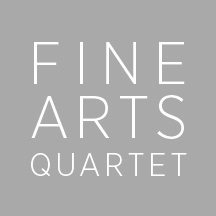"Some of the best Dvorak playing ever comes from the veteran American Fine Arts Quartet, who are already 2 albums in their cycle. The first, Spirit of Bohemia, is excellent but the second, Quartet 2, is even finer (Naxos)...The fillers, in this case the Bagatelles, prove to be gems. This quartet is unbelievably good (better than the old iterations), and I’ve previously recommended their Mozart Piano Concerto transcriptions with wonderful pianist Alon Goldstein (Naxos), several albums’ worth of delights."(cheaptubeaudio.blogspot.com, 25 March, 2024) https://cheaptubeaudio.blogspot.com/2024/03/streaming-classical.html
"The Fine Arts Quartet touchingly captures the Bohemian character, the folk song-like quality that is a basic element in Dvorak’s music. Lots of charm, a soft sound and supple bowing provide the necessary lightness and a slight smile behind the notes. This grace can also be found in the string quartet – here, however, it comes across more as intimate passion, which is transformed into convincing expressivity through the daring harmonies. Despite the quasi-rhapsodic structure of the work, the Fine Arts Quartet never allows the songfulness of Dvorak’s music to be forgotten by finely differentiating the forward-looking harmonies so that the composition never becomes piecemeal. This also applies to the dance-like moments, which appear again and again and form an exciting symbiosis with Dvorak’s new ideas in this interpretation – in a quartet that also formally dispenses with classical structures." (Guy Engels, Pizzicato, 12 January, 2024) https://www.pizzicato.lu/dvorak-der-kuhne/
"In beiden Werken trifft das Fine Arts Quartet in berührender Manier den böhmischen Charakter, das Volksliedhafte, das in Dvoraks Musik ein Grundelement ist. Viel Charme, ein weicher Klang und geschmeidiger Bogenstrich sorgen für die nötige Leichtigkeit und ein leichtes Schmunzeln hinter den Noten. Diese Anmut findet sich auch im Streichquartett wieder – hier wirkt sie allerdings eher als intime Leidenschaft, die sich über die gewagten Harmonien in überzeugende Expressivität wandelt. Trotz der quasi rhapsodischen Anlage des Werkes, lässt das Fine Arts Quartet die Gesanglichkeit von Dvoraks Musik nie vergessen, indem es die vorausschauende Harmonik fein ausdifferenziert, so dass aus der Komposition nie Stückwerk wird. Dies gilt ebenso für die tänzerischen Momente, die immer wieder auftauchen und in dieser Interpretation eine spannende Symbiose mit Dvoraks neuen Ideen eingehen – in einem Quartett, das auch formal auf klassische Strukturen verzichtet. (Guy Engels, Pizzicato, 12 January, 2024) https://www.pizzicato.lu/dvorak-der-kuhne/
"The Fine Arts Quartet is a fabulous ensemble (Ralph Evans, Efim Boico, violins; Gil Sharon, viola; Niklas Schmidt, cello)...The Fine Arts Quartet have the full measure of the composers expressive way here, and as the music becomes more animated (six-seven minutes in), it is as if a ray of sunlight traverses the texture. All credit to Ralph Evans for traversing the high-lying passages so well around the ten-minute mark...Evans' violin sings eloquently, as does Niklas Schmidt's cello, while Gil Sharon makes a lovely, warm viola sound. All four parts intertwine perfectly. The shift to the Allegro giusto is exquisite, and exquisitely managed here. The textures Dvořák writes are often quite bare, and it takes a fine quartet to honour them, to give them fragility rather than just have them sound skeletal...A most satisfying disc full of loving performances." (Colin Clarke, Classical Explorer, Jan 25, 2024) https://www.classicalexplorer.com/dvo/
"Se tratan de obras de salón encantadoras y de gran interés para seguir el pulimiento del compositor, y el Cuarteto las interpreta con un aire ligero y genial, comprometidos con la música, dejan la impresión de que tocan casi sin esfuerzo y evitan por completo la pretensión...Felicitaciones al Fine Quartet por un programa atrevido que ofrece algunos hallazgos reales que hasta entonces pocas veces se habían grabado." (Luis Suárez, Tarraco’s Culture Club, January 2024)
"These are charming salon works and of great interest to follow the composer's polish, and the Quartet performs them with a light and genial air, committed to the music, leaving the impression that they play almost effortlessly and completely avoiding pretension...Congratulations to the Fine Quartet for a daring program that offers some real finds that until then had rarely been recorded." (Luis Suárez, Tarraco’s Culture Club, January 2024)
"The venerable Fine Arts Quartet is to be commended for a genuinely adventurous program...a wonderful romp through some odd corners of the Dvořák repertory that will be valued highly by those who love the composer." (James Mannheim, AllMusic, March, 2024)
